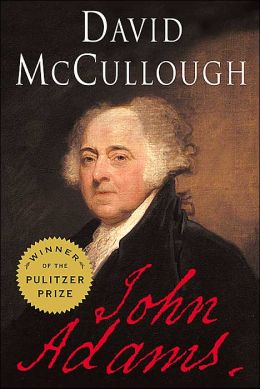In a continuation of my quest to expand my knowledge, this week I'm reviewing the widely-acclaimed biography of John Adams by Davide McCullough. This text focuses on Adams's life, starting with his early years and entry to Harvard at age fifteen, to his eventual death on July 4th, 1826, the same day as Thomas Jefferson and the fiftieth birthday of the United States. Fortunately for historians Adams was a prolific writer during his lifetime, engaged not only in correspondence with dozens of people over the years but also writer of a handful of essays and pamphlets and a regular diarist. This provides a great amount of insight into Adams's own thoughts, feelings, and motivations, as well as how other people perceived him in their own writings. Although by no means the final word on John Adams, it provides a very good look into one of the oft overlooked founding fathers.
John Adams has often been overlooked in American history, and no one was more aware of this fact than John Adams. And I suspect part of it was the fact that Adams is, in a way, rather boring. He doesn't have the wit, charm, and skill with the ladies like Benjamin Franklin. He doesn't have the imposing stature and dignity of George Washington (Although Adams certainly shared Washington's reputation for honor and integrity.) And he doesn't have the reclusive genius of Thomas Jefferson. Adams is described consistently in this book, as well as in the writings of his contemporaries, as a man of integrity; who's candid, forthright, honest, and reliable. Practically the very epitome of New England Puritan virtue. And I personally rather like those virtues in a person and find them something to aspire towards, but it certainly doesn't make for interesting copy. Adams is simply overshadowed by the more colorful characters that inhabited the same time period as himself and so definitely merits reappraisal.
I will say that this biography paints Adams in very glowing terms, and there definitely seems to be a lot to admire, such as his aforementioned virtues, but it makes me wonder how much this should be taken with a grain of salt. There are numerous points where McCullough makes a point to talk about how exceptional or, in many cases, self-sacrificing Adams's behavior has been. McCullough exults in Adams's eight years and thousands of miles travelled in Europe calling upon the governments of France, the Netherlands, and England as an emissary of the United States, as well as his years of painful separation from his wife Abigail. Although other figures such as Benjamin Franklin and Thomas Jefferson had to suffer separations from loved ones as well as difficulties in Europe. Adams's efforts in supporting the Declaration of Independence, his drafting of the Massachusetts state constitution, and his service as the first Vice President of the United States are all given glowing reports from McCullough. To be fair, Adams doesn't get terribly much praise for these efforts as part of his overall neglect in history, but I feel sometimes that McCullough was laying it on a little thick, as if to make up for all the decades of neglect. And considering McCullough's criticism of other figures such as Benjamin Franklin, Thomas Jefferson, and Alexander Hamilton, it almost feels like McCullough is on Adams's side.
Thomas Jefferson specifically plays a large part in this book, which is reasonable considering his friendship, then enmity, then friendship with Adams over the years. McCullough even talks about the contrasts between the two men, such as Jefferson living off the backs of slave labor while isolated at his mountaintop villa, while Adams works on his own farm surrounded by family and neighbors in the small-town spirit of New England. Considerable focus is spent on Jefferson's habit of rebuilding practically any structure he inhabited, usually at great personal expense, which contributed to Jefferson's eventual bankruptcy by the time of his death. By contrast Adams wholeheartedly embraces the Puritan ideals of thrift and independence and remains fiscally solvent for most of his life, despite considerable fiscal pressures. I feel like McCullough almost goes a little too far in building up Adams and tearing down Jefferson as a biographer, and I'm not a terribly big fan of Jefferson in the first place.
I'm also interested in trying to read more about Alexander Hamilton, who plays a large role during Adams's Vice Presidency and Presidency and certainly was no friend to either John or Abigail. In this book he's portrayed as the consummate power-hungry schemer with almost imperial ambitions for America. Personally I don't know terribly much about Hamilton beyond his advocacy for a strong central government and a national bank, both measures I find to be rather reasonable. (I'll admit it, I'm a Federalist.) So to see this more ambitious side of Hamilton is a bit of a surprise and it makes me curious to say the least.
Ultimately I feel like this is a fairly good biography, if nothing else then because it educates people about one of our more-overlooked presidents and Founding Fathers. It is a little effusive in its praise so reading of different sources for more information on this subject material is probably a good idea as well.
- Kalpar


No comments:
Post a Comment